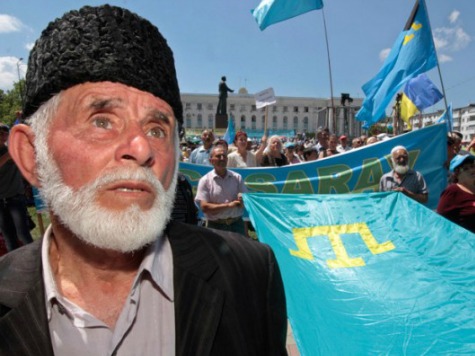
Tatars in Crimea were concerned when Russia took over the Black Sea Peninsula from Ukraine in mid-March. Russia promised fair and equal treatment, but are slowly going back on their word.
Now it appears their fears were justified. A new warning was issued after 1,000 Tatars protested Crimean authorities for not allowing Tatar leader Mustafa Dzhemilev to return to the peninsula.
On Monday, Crimea’s chief prosecutor Natalia Poklonskaya said members of the Crimean Tatars’ self-governing council, known as the Mejlis, were suspected of “extremist activity.” She didn’t announce any charges but warned that the council could be dissolved and banned across Russia. The threat comes after the breakaway region’s new authorities last month barred a prominent leader of the Muslim group from returning to Crimea for five years after he left for meetings in Kiev.
Unfortunately, the ruling comes just a week before the Tatars will “commemorate the 70th anniversary of their exile from Crimea to Central Asia on May 18.”
Dzhemilev is not just a Tatar leader. He spent many years in Soviet jails fighting for equal rights for Tatars. In order to ease the transition, the Kremlin attempted to persuade Dzhemilev to support Russia. He said no and was very vocal against the annexation. In April on his way to Kyiv, border agents told him he would not be able to return to Crimea for five years. He tried to fly back from Kyiv last week, but Russia said no. When he drove back the border agents stopped him from entering the peninsula.
Though the legal basis of the ban has never been explained, it appears to have originated with Crimea’s separatist leaders. “Those who come here with bad intentions won’t be allowed to enter,” Crimea government chief Sergei Aksenov said of Mr. Dzhemilev recently.
While he is facing discrimination in Crimea, Poland awarded Dzhemilev the “Solidarity Prize.”
“He is a defender of Ukraine’s integrity,” said Polish Foreign Minister Radoslaw Sikorski, as he announced Dzhemilev had been awarded the prize.
“He is someone who, together with his people, has demonstrated that democracy is possible.”
Dzheimilev was nominated for the Nobel Peace Prize in 2011.
Tatars used to be the majority in Crimea, but Soviet leader Josef Stalin deported the majority of them to Central Asia after World War II. He accused the Tatars of working with Hitler and the Nazis. The people only started to return home in the late 1980s and now make up 12% of the population.

COMMENTS
Please let us know if you're having issues with commenting.